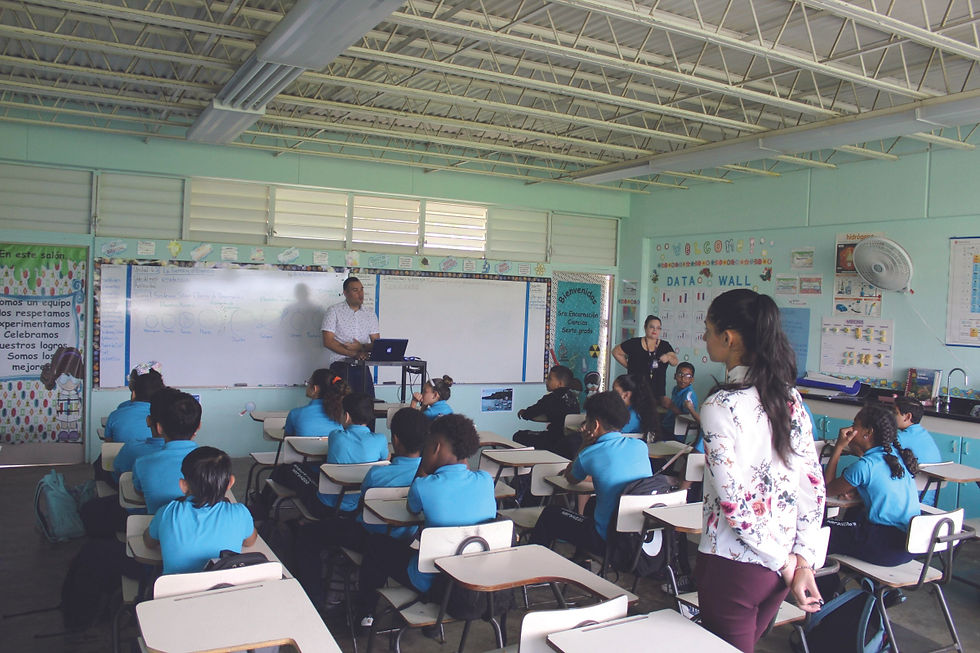With classes set to start, therapy services for special needs students remain in crisis
- The San Juan Daily Star

- Aug 12, 2025
- 3 min read

By The Star Staff
Just days before the start of the new school year, the Puerto Rican Association of Health and Education-Related Service Providers (APPSSRE by its initials in Spanish) has issued a warning about an unprecedented crisis in the provision of therapy services to Special Education students under the Provisional Remedy Unit.
The crisis, the APPSSRE says, has been exacerbated by the failure on the part of the executive branch of the island government to comply with the agreement reached on June 12 of this year, leading to more students experiencing violations of their constitutional rights to an education that promotes the full development of the human personality, as guaranteed by the Puerto Rico Constitution. Additionally, these students have a right to receive a free and appropriate public education in accordance with federal laws, such as the Individuals with Disabilities Education Act (IDEA).
As of June 26, the island Education Department reported that the Provisional Remedy Unit serves 28,113 students. However, the department acknowledges that there are 32,607 students with active letters who do not have an assigned provider, indicating that the number of students without services exceeds those currently served. Furthermore, according to the Rosa Lydia Vélez Class Action Compliance Report 2023-24 (p. 300), 62,005 students did not receive therapy services within 30 days of their annual Individualized Education Program review. Although it is unclear how many of these students subsequently received a provisional remedy letter, the data confirms that the number of students without services is significantly higher than those currently served by the Unit. The situation reveals a critical need for urgent measures to attract and retain providers, the APPSSRE noted.
The crisis not only threatens access to federal funds due to noncompliance with the IDEA, it also poses a direct threat to students and their families. Those affected, the APPSSRE pointed out, are children and young people whose therapy is interrupted, whose progress and opportunities are lost, and whose developmental lags continue to deepen.
The refusal to increase fees is not just an isolated administrative decision; it actively worsens the lack of services, encourages the exodus of specialists, reduces the number of available providers, and limits the capacity to meet the already identified needs, the association said.
The APPSSRE added that the secretary of education’s refusal to review and increase fees violates Law 85, which establishes that:
1. The secretary of the Department of Education is responsible for setting fees.
2. Fees must be adjusted to reflect market performance.
3. The fee structure should facilitate the provision of services.
None of the above mandates are currently being met, and even more concerning, according to the APPSSRE, is that selective fee adjustments have been granted to a few providers, as acknowledged by the Department of Education, resulting in inequity and discrimination in compensation for the same services.
“Is access to services guaranteed by law now a privilege that must be negotiated?” the association queried.
In 2021, the Education Department attempted to reduce service rates, citing the authority granted to the secretary by Law 85-2018 to adjust fees according to market conditions. The study commissioned to justify that action, the APPSSRE said, had methodological flaws and was based on irrelevant references, such as the Vital Plan (Medicaid) rates. Thanks to APPSSRE’s analyses and the insights from Remedios providers who also serve through the Vital Plan, the department abandoned its intention to cut rates and implemented minimal increases for some services. However, as of 2015, 11 services have not seen any fee adjustments, and eight others have received insufficient increases.
An updated economic analysis by APPSSRE, conducted with the expertise of Dr. José Alameda, indicates that an immediate rate increase of at least 30% is necessary to address the loss of purchasing power due to rising operating expenses. That adjustment, the association said, should be viewed not as a typical rate increase, but as an essential corrective measure to restore the operational capacity of providers.




Comments